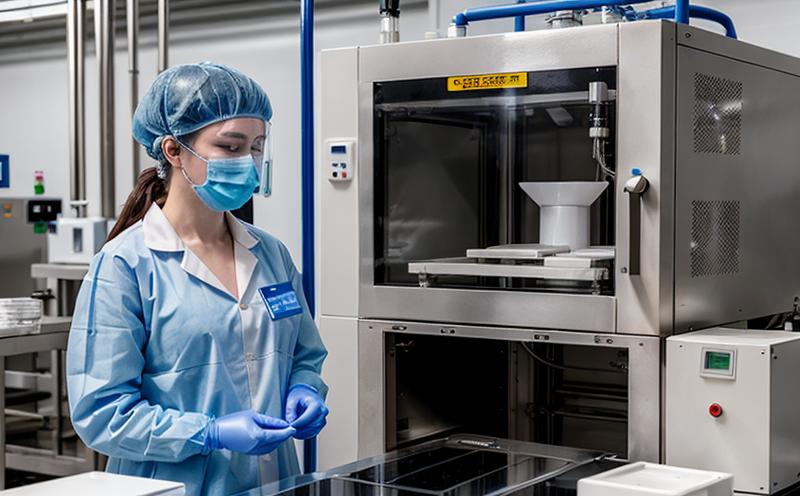GMP Calibration Verification Testing
In pharmaceutical manufacturing, compliance with Good Manufacturing Practice (GMP) regulations is paramount. This ensures that products are consistently of high quality and meet the safety standards required by regulatory bodies like the FDA, EMA, and WHO.
One critical aspect of GMP compliance involves calibration verification testing. Calibration is the process of adjusting instruments to ensure accuracy in measurements. Verification confirms that these adjustments maintain precision over time. This service plays a crucial role in ensuring consistent product quality by preventing errors in measurement which could lead to substandard products.
Calibration verification testing typically includes several key steps. Instruments used for manufacturing processes are identified and categorized based on their criticality. These instruments may include pH meters, temperature sensors, pressure gauges, chromatographs, and more. Each instrument is then calibrated using standard calibration solutions or methods that meet the appropriate international standards (e.g., ISO 17025).
The calibration process involves comparing the instrument’s readings with known reference values. This step ensures that any discrepancies are identified early on. Once calibrated, verification tests are conducted at regular intervals to monitor stability and accuracy. These verifications often include re-calibration if a specified threshold is exceeded.
Accurate calibration is essential for several reasons. First, it directly impacts the quality of the final product. Inconsistent measurements can lead to variations in formulation, which might result in ineffective or even harmful products. Second, reliable instruments are crucial for adhering to regulatory standards, thus protecting consumer health and safety.
Our service ensures that all calibration verification tests comply with strict GMP guidelines. We use state-of-the-art equipment calibrated against national standards to provide precise results. Our team of experts conducts thorough audits and provides comprehensive reports documenting the entire process.
In summary, GMP calibration verification testing is an integral part of maintaining high-quality pharmaceutical products. By ensuring accurate measurements throughout the manufacturing process, we help pharmaceutical companies meet stringent regulatory requirements while enhancing product reliability and patient safety.
Benefits
The benefits of GMP calibration verification testing are numerous and significant for any pharmaceutical company. Firstly, it enhances operational efficiency by minimizing downtime due to instrument failure or recalibration needs. Secondly, compliance with GMP standards reduces the risk of regulatory penalties and recalls. Thirdly, accurate measurements contribute to improved product quality, which is vital in maintaining brand reputation.
From an environmental perspective, this service supports sustainability goals by optimizing resource use. By ensuring that instruments are operating at peak efficiency, energy consumption can be minimized. Additionally, accurate calibration helps reduce waste and improve process yields, leading to cost savings for the company.
In terms of application examples, consider a scenario where an instrument used in quality control fails to calibrate correctly. This could lead to incorrect product formulations or even contamination issues. Our calibration verification testing ensures that such problems are identified early, preventing potential disasters in production.
Environmental and Sustainability Contributions
The environmental impact of pharmaceutical manufacturing is considerable due to the extensive use of resources like water, electricity, and raw materials. By ensuring accurate calibration through our services, we contribute significantly to sustainability efforts.
Accurate measurements reduce the amount of waste generated during production processes. When instruments are not calibrated properly, they may produce excess product or require additional steps to correct errors, leading to increased resource consumption. With precise calibration, these inefficiencies can be minimized, conserving energy and reducing raw material usage.
Moreover, our service helps pharmaceutical companies comply with environmental regulations, which is becoming increasingly important in the global market. By ensuring that all processes meet strict GMP standards, we promote a more sustainable approach to manufacturing.
Use Cases and Application Examples
In the pharmaceutical industry, calibration verification testing has diverse use cases across various stages of production. For instance, during formulation development, accurate calibrations ensure that the precise quantities of active ingredients are used in each batch.
An example application involves a company developing a new oral liquid medication. During clinical trials, they must ensure that each dose administered is consistent and safe. Our calibration verification testing ensures that all instruments measuring dosages are accurate, thus supporting reliable trial data collection.
In another scenario, an injectable drug product undergoes rigorous quality control checks before release to the market. Calibration verification testing helps guarantee that every unit produced meets stringent safety standards. This not only protects public health but also enhances consumer trust in the brand.





